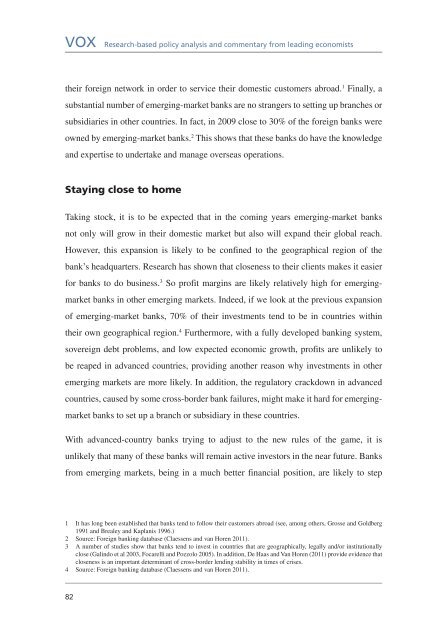You also want an ePaper? Increase the reach of your titles
YUMPU automatically turns print PDFs into web optimized ePapers that Google loves.
VOX Research-based policy analysis and commentary from leading economists<br />
their foreign network in order to service their domestic customers abroad. 1 Finally, a<br />
substantial number of emerging-market banks are no strangers to setting up branches or<br />
subsidiaries in other countries. In fact, in 2009 close to 30% of the foreign banks were<br />
owned <strong>by</strong> emerging-market banks. 2 This shows that these banks do have the knowledge<br />
and expertise to undertake and manage overseas operations.<br />
Staying close to home<br />
Taking stock, it is to be expected that in the coming years emerging-market banks<br />
not only will grow in their domestic market but also will expand their global reach.<br />
However, this expansion is likely to be confined to the geographical region of the<br />
bank’s headquarters. Research has shown that closeness to their clients makes it easier<br />
for banks to do business. 3 So profit margins are likely relatively high for emergingmarket<br />
banks in other emerging markets. Indeed, if we look at the previous expansion<br />
of emerging-market banks, 70% of their investments tend to be in countries within<br />
their own geographical region. 4 Furthermore, with a fully developed banking system,<br />
sovereign debt problems, and low expected economic growth, profits are unlikely to<br />
be reaped in advanced countries, providing another reason why investments in other<br />
emerging markets are more likely. In addition, the regulatory crackdown in advanced<br />
countries, caused <strong>by</strong> some cross-border bank failures, might make it hard for emergingmarket<br />
banks to set up a branch or subsidiary in these countries.<br />
With advanced-country banks trying to adjust to the new rules of the game, it is<br />
unlikely that many of these banks will remain active investors in the near future. Banks<br />
from emerging markets, being in a much better financial position, are likely to step<br />
1 It has long been established that banks tend to follow their customers abroad (see, among others, Grosse and Goldberg<br />
1991 and Brealey and Kaplanis 1996.)<br />
2 Source: Foreign banking database (Claessens and van Horen 2011).<br />
3 A number of studies show that banks tend to invest in countries that are geographically, legally and/or institutionally<br />
close (Galindo et al 2003, Focarelli and Pozzolo 2005). In addition, De Haas and Van Horen (2011) provide evidence that<br />
closeness is an important determinant of cross-border lending stability in times of crises.<br />
4 Source: Foreign banking database (Claessens and van Horen 2011).<br />
82














